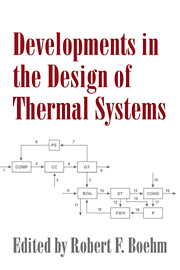Book contents
- Frontmatter
- Contents
- Preface
- Biographical sketches of the authors
- 1 Introduction and trends in the thermal design field
- 2 Computer-aided process design trends in the power industry
- 3 Automated design of chemical process plants
- 4 Thermophysical properties for design simulations
- 5 Introduction to Pinch Analysis
- 6 Second Law applications in thermal system design
- 7 Thermodynamic optimization of heat transfer and fluid flow processes
- 8 An introduction of thermoeconomics
- 9 Artificial intelligence in thermal systems design: concepts and applications
- Subject Index
- Author Index
6 - Second Law applications in thermal system design
Published online by Cambridge University Press: 23 September 2009
- Frontmatter
- Contents
- Preface
- Biographical sketches of the authors
- 1 Introduction and trends in the thermal design field
- 2 Computer-aided process design trends in the power industry
- 3 Automated design of chemical process plants
- 4 Thermophysical properties for design simulations
- 5 Introduction to Pinch Analysis
- 6 Second Law applications in thermal system design
- 7 Thermodynamic optimization of heat transfer and fluid flow processes
- 8 An introduction of thermoeconomics
- 9 Artificial intelligence in thermal systems design: concepts and applications
- Subject Index
- Author Index
Summary
The importance of developing thermal systems that effectively use energy resources such as oil, natural gas, and coal is apparent. Effective use is determined with both the First and Second Laws of thermodynamics. Energy entering a thermal system with fuel, electricity, flowing streams of matter, and so on is accounted for in the products and by-products. Energy cannot be destroyed – a First Law concept. The idea that something can be destroyed is useful. This idea does not apply to energy, however, but to exergy – a Second Law concept. Moreover, it is exergy and not energy that properly gauges the quality (usefulness) of, say, one kilojoule of electricity generated by a power plant versus one kilojoule of energy in the plant cooling water stream. Electricity clearly has the greater quality and, not incidentally, the greater economic value.
Preliminaries
In developed countries worldwide, the effectiveness of using oil, natural gas and coal has markedly improved over the last two decades. Still, use varies even within nations, and there is room for improvement. Compared with some of its principal international trading partners, for example, U.S. industry as a whole has a higher energy resource consumption per unit of output and generates considerably more waste. These realities pose a challenge for maintaining competitiveness in the global marketplace.
For industries where energy is a major contributor to operating costs, an opportunity exists for improving competitiveness through more effective use of energy resources. This is a well known and largely accepted principle today.
Information
- Type
- Chapter
- Information
- Developments in the Design of Thermal Systems , pp. 139 - 172Publisher: Cambridge University PressPrint publication year: 1997
Accessibility standard: Unknown
Why this information is here
This section outlines the accessibility features of this content - including support for screen readers, full keyboard navigation and high-contrast display options. This may not be relevant for you.Accessibility Information
- 2
- Cited by
